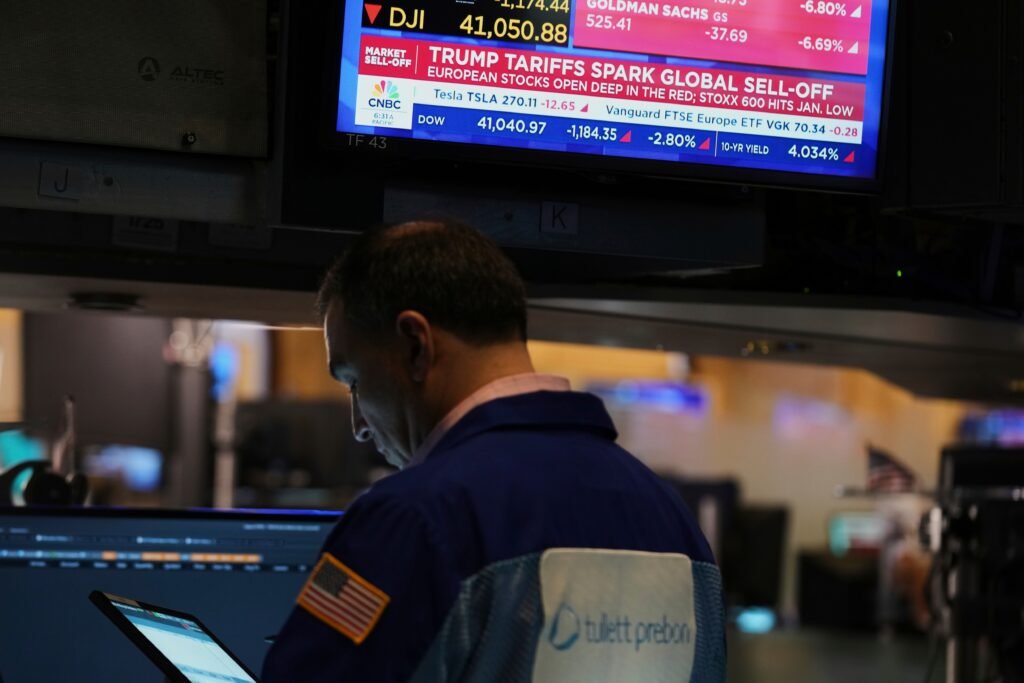Indian IT stocks faced a jolt on Wall Street after US President Donald Trump imposed a steep new fee on H-1B visas, a move that threatens to cripple the flow of skilled Indian engineers to America. On Friday, Infosys’ American Depository Receipts (ADRs) fell sharply by 3.41 per cent to $16.97 on the New York Stock Exchange, while the Wipro ADRs declined by 2.10 per cent to $2.80. Cognizant — whose operations are heavily anchored in India — slipped 4.75 per cent to close at $66.94. The visa shock is expected to drag down shares of IT companies in Indian markets.
The fall came after Trump’s executive order announced an unprecedented $100,000 annual fee on H-1B visas, which are the backbone of Indian IT companies operating in the US. The order strikes at the heart of outsourcing and on-site deployment models that have sustained Indian software exporters for decades. Infosys and Wipro, which send thousands of Indian engineers to client locations in the US, were among the worst hit. India’s largest IT firm, Tata Consultancy Services (TCS), was shielded from immediate market reaction as it does not have an ADR listing in the US.
Ripples for Indian markets
The tremors are unlikely to remain confined to New York. Analysts expect Indian markets, especially IT counters, to bear the brunt when trading resumes on Monday. “In the coming week, markets will first react to the US President’s executive order imposing an annual fee of $100,000 on H-1B visas, announced late Friday. While export-driven sectors are already grappling with tariff-related pressures, this move could further weigh on IT services exporters at a sensitive time when trade negotiations remain underway,” said Ajit Mishra, SVP, Research, Religare Broking.
Another analyst noted that sentiment around IT stocks has already been fragile. “Tech shares are expected to trade lower when the market opens for trading on Monday. There’re expectations that Donald Trump will relax the huge hike in H1-B visa fee,” he said. The weakness is already visible in valuations amid the trade tariff tension. Infosys has declined by 23 per cent from its 52-week high of Rs 1,540.30 on the BSE in the last 8 months. TCS too has lost ground, dropping by more than 29 per cent from its 52-week high of Rs 4,494 to trade at Rs 3,169.85.
Other leading IT firms, including Tech Mahindra and HCL Technologies, which maintain a significant US presence, are also confronting uncertainties.
Indian engineers in the crossfire
The new visa rules strike directly at Indian engineers working in the United States. As of March 31, 2025, Infosys employed 323,578 people globally, with a significant share of Indian engineers in the US, though the company does not disclose exact figures. Their presence has been crucial in maintaining client relationships and delivery centres across America.
TCS, with a global workforce exceeding 607,000, has built a strong footprint in North America. It employs more than 46,000 associates across 32 U.S. locations, including New York, Edison, Cincinnati, Santa Clara, Phoenix and Austin. While TCS too avoids breaking down employee numbers by nationality, it is widely acknowledged that a large portion of its onshore staff in the US is of Indian origin. “The challenge goes beyond market sentiment—the established model of deploying Indian engineers in the US is facing a direct threat. Unless the new fee is rolled back or eased, companies and employees will have to adjust, either by hiring more locally or shifting a greater share of work offshore,” an analyst said.
Story continues below this ad
Remittance flows at risk
The stakes extend beyond corporate profits. If the new rules force a large number of Indian engineers to return, the impact on remittances could be severe. India is the world’s top remittance recipient, receiving $129 billion in 2024. Notably, nearly 28 per cent of these inflows originated from the US.
The strain would be felt most acutely in states that rely heavily on overseas income. “Strained Indian diaspora will make it difficult for families in Kerala, Uttar Pradesh, and Bihar to meet basic needs like education, healthcare, and housing,” warned Manoranjan Sharma, Chief Economist, Infomerics Valuation and Ratings Ltd.
The big question lingers: will America’s new visa regime derail the growth engine of India’s most globalised IT industry?

